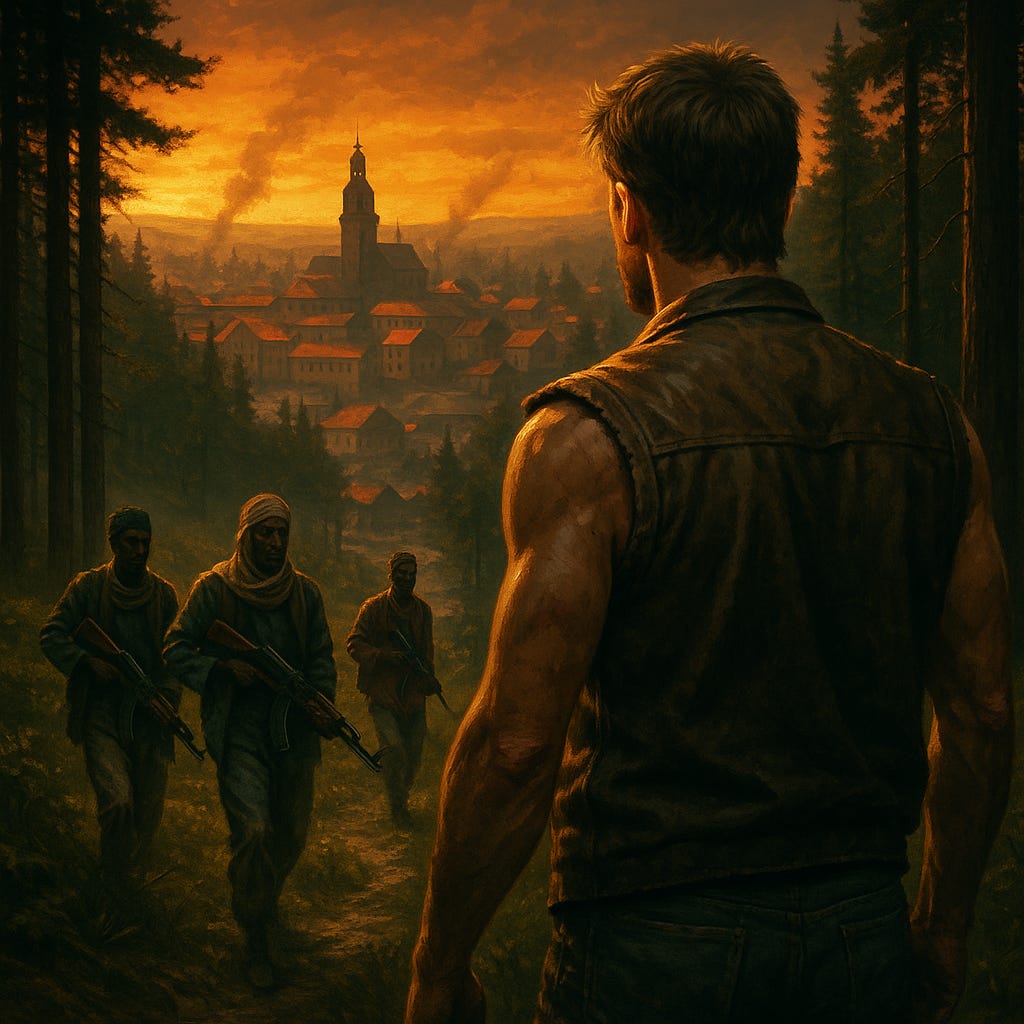Short Story: The Man at the Edge
Prepping won’t save you. Brotherhood might. A short story from the edge of a fallen state.
This week’s letter from Beyond Collapse takes the form of a short story. But don’t mistake it for fiction. It is rooted in the real.
The scenario is not far off. Across the Western world, the state is retreating from its periphery. In rural Sweden, entire municipalities are quietly abandoned. Urban zones fracture into competing clans. And still, many dissidents believe that individual prepping will save them.
This story is for them.
For us.
***
The store shelves had been empty for months, but the city still flickered with life — gangs, checkpoints, rival patrols, all carving up what was left. The state had stopped pretending weeks ago.
Marcus stayed inland, on the edge of what used to be Sweden. Somewhere between forest and farmland. No signal, no taxes, no law.
He had prepped for this. Years before the cracks showed, he’d filled his grandfather’s barn with solar panels, dried beans, ammunition and books. He called it realism. Said he was ready.
And he was, in the shallow sense. He had food. Fire. Tools.
But not people.
The nearest town had turned months ago. First came the “community watch,” then the foreign flags, then the checkpoints. Now, Somali patrols controlled the square, and the local church had been turned into a food depot — guarded by men who didn’t speak Swedish.
It wasn’t Mad Max. It was worse. It was foreign order. Imposed with calm.
He kept to the edge, moving at night, watching the new hierarchies form. Not chaos. Just new kings.
And he had no tribe.
One morning, through a battered old radio, a voice crackled in the static.
“…only Swedes inside the perimeter. Farmers, builders, teachers welcome. No looters. No cowards. Symbol required. Daily roll call at sunrise. The choir will sing after evening meal…”
Marcus froze.
There had been whispers. A homestead alliance out in the hills. Built before the collapse, not after. Not a gang. Not a cult. A clan. Swedish. Ethnic. Intentional.
He looked around at the crates, the tools, the guns.
All the gear in the world. No flag. No children. No songs.
That night, he packed light. Rifle, knife, axe. One old photo of his grandmother in folk dress. Just in case someone asked who he was.
He walked north, away from the broken zones.
Through forests. Past burned farmhouses marked with strange graffiti. Once, he saw a family watching him from inside a barn, faces pale, windows boarded. No one waved.
On the third day, he crossed a stream where an old road used to run. There, set back in the trees, was a wall. Wooden. Etched with runes he remembered from childhood books.
Two men stepped forward. Bearded, steady, no insignia but a woven red-and-white band on their left arms.
One spoke.
“Name?”
“Marcus.”
“Folk?”
“Swedish. From Halland. Grandfather fought in Finland.”
The man nodded.
“Trade?”
“Woodwork. Hunting. Can teach history.”
He hesitated, then added, “I brought nothing but what I can carry. No vice. No wife.”
“Can you sing?”
“I can learn.”
They let him in.
What he saw made his throat tighten. Not from fear. From something older.
Fences repaired. Firewood stacked. Boys training with wooden rifles. A woman teaching two girls to bind books. Flags on the walls — not printed, but stitched.
At dusk, a bell rang. They gathered, not to eat first, but to sing. A hymn he half-remembered. About fathers, and fields, and winter’s trials.
No clapping. Just silence and breath.
He was given a place to sleep. A bunk in a longhouse with twenty others. Men of his kind. All scarred, but none broken.
In the morning, he was assigned to the woodshop. Another man, older, greeted him with a handshake and a quiet “Welcome home.”
That day, Marcus worked without talking. He saw order, not imposed but chosen. Not by law, but by blood and memory.
He understood now.
Prepping was a way to avoid the truth. A way to hide alone with your gear, your pride, and your fear. But collapse wasn’t the beginning of freedom. It was the test. And only the organized passed.
Not the strong. Not the smart. The rooted.
That night, as the fire crackled and boys read aloud from an old saga, Marcus looked at the stitched band they’d tied around his arm.
He still had no wife. No child.
But he had a flag again. And that was a start.
***
Closing words
Prepping is not a plan.
Not unless it leads to people. Not unless it scales.
A bunker full of beans is not a future.
And a man with ten rifles but no brothers is already outnumbered.
When the system erodes, something always replaces it.
It won’t be liberty. It won’t be peace.
It will be tribes. Gangs. Ethnic networks.
If you want to survive, you must organize.
If you want to win, you must build.
Not alone, but together.
Not with gadgets, but with structure, loyalty, and shared blood.
Stop waiting for collapse to “wake people up.”
Start building something worth waking up to.






This outlines perfectly the reasons we started the woodlander initiative. Community, family, tradition. We now have 4 plots of land, we have over 1000 members and 20 who are now land owners.